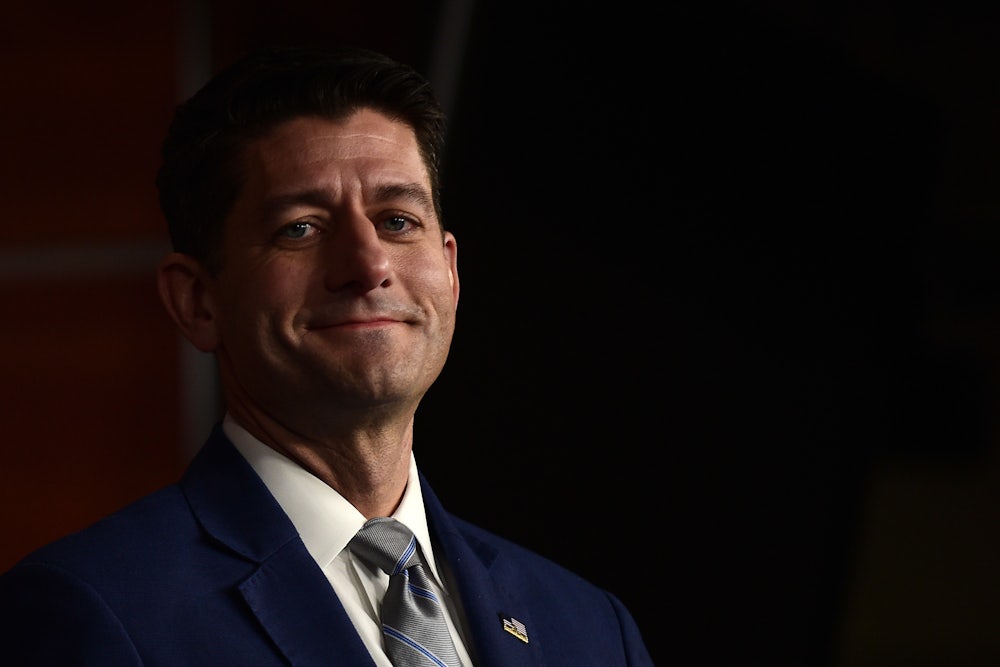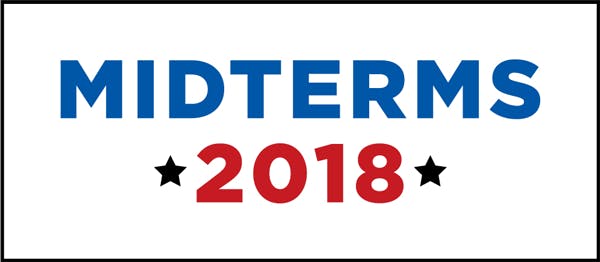Ever since he announced his retirement in April, Speaker Paul Ryan has largely avoided the limelight, emerging now and then to repel another far-right rebellion in the House or gently criticize President Donald Trump over the latest outrage (such as opposing birthright citizenship). Mostly, Ryan has tried to steer clear of Trump, with whom he has clashed and whose presidency many believe convinced Ryan to retire. Asked by CBS News’ John Dickerson last week if Trump practices “inclusive politics which tries to unify,” Ryan shrugged. “Sometimes he does and sometimes he doesn’t,” he said.
You get the sense that, with his political career winding down, Ryan just wants it all to be over. But that doesn’t mean he isn’t thinking about his legacy.
Pressed on his accomplishments back in April, Ryan was modest: “I think we’ve achieved a heck of a lot.... I like to think I’ve done my part, my little part in history to set us on a better course.” That’s as much of a self-assessment as he’ll allow—at least until he signs a hefty book deal with Crown Forum. But on Friday, Ryan published an op-ed in the Washington Examiner that, though ostensibly about turning out GOP voters in Tuesday’s midterm elections, doubled as a political obituary.
It’s a fascinating document, springing from a kind of funhouse-mirror world of Republican politics—one in which Ryan’s disingenuous brand of think tank conservatism has won out over Trump’s demagogic dog whistles, and where Republican congressmen are running for re-election on the roaring economy rather than a caravan of migrant asylum-seekers. It’s also an attempt to launder his legacy, by claiming undue credit for the state of the economy and implicitly justifying the Republican Party’s submission—especially his own—to Donald Trump.
Trump’s name does not appear in Ryan’s op-ed, which is fitting given that Ryan has gone to great lengths to avoid uttering it and often professes ignorance of Trump’s latest offenses. But the absence, while part of a longstanding pattern, suggests wishful thinking on Ryan’s part—and lends an unreality to the article, as if it were being published during a very different election. “When House Republicans campaigned in 2016, we made the American people a promise,” Ryan began. “We said that if voters placed their confidence in us and entrusted us with a mandate to govern, we would lead on the tough issues and improve people’s lives with our ideas.”
That’s a very different version of the 2016 election than most Americans experienced it. Outside of the central, character-driven fight between Donald Trump and Hillary Clinton, congressional Republicans largely campaigned, for the fourth consecutive election, on repealing Obamacare and exploited instability in the insurance exchanges to protect their majorities. But Ryan and House Republicans also campaigned on an ambitious tax plan that would provide widespread tax relief—though 99.6 percent of the benefits would go to the top 1 percent in less than a decade, according to a contemporaneous study from the the nonpartisan Tax Policy Center.
This was to be expected from Ryan, who built his political career by framing welfare-gutting and upward wealth redistribution as bold, innovative policymaking. Casting himself as the heir to Jack Kemp’s brand of compassionate conservatism, but also a new kind of right-wing policy wonk, he hoodwinked Beltway journalists for years and nearly got away with it.
The cracks in the facade of his carefully cultivated image emerged during his failed—and at times embarrassing—2012 vice presidential campaign. Ryan’s great strength, as explained by Alec MacGillis in a 2012 profile in The New Republic, was not as a master of policy, but a shrewd exploiter of changing political winds. But once Ryan successfully cast himself as the party’s leading conservative wonk, it seemed that nothing—neither repeated policy failures nor evidence of his grift—could dent his standing. “Once you gain a reputation as a Serious Man in Washington, it’s almost impossible to lose it,” MacGillis wrote.
But Trump’s rise exposed Ryan for the fraud that he always was: a bog standard Republican, just one with a P90X obsession. While he was able to bring Trump over to his broader plutocratic program, larger failures—particularly on Obamacare repeal, though the House did eventually pass it—exposed him as someone with noticeably little to offer when it came to ideas. “The Speaker, not the president, is the greatest political fraud of our time,” Jeet Heer wrote in these pages shortly after Ryan’s shoddy attempt at Obamacare repeal crashed and burned in March of last year.
Ryan took the speakership in 2015 to quell a Republican Civil War, but was never quite able to tame the GOP’s right flank, which continued to thumb its nose at him. There was a sense, when he took the job, that he was the only man who could bridge the divides within the Republican Party, but he was barely able to do that. Despite having a unified government, Republicans have accomplished startlingly little over the last two years. But Ryan, cosplaying Ronald Reagan’s sunny optimism, sees only success. “Two years later, I’m proud that we have upheld our end of the bargain,” he wrote in last week’s op-ed. “We passed more than 1,000 bills in the House that make a meaningful difference.”
Asked for documentation, a Ryan spokesperson pointed me to this fact-check from the The Daily Caller News Foundation, which shows that the House has indeed passed more than 1,000 bills this session. But volume isn’t a very good way to judge the effectiveness of a legislative body. “You can’t count the number of bills (of which there has been close to the fewest in modern history) or the number of pages of bills (of which there has been close to the most in modern history). You have to ask whether Congress has enacted meaningful legislation,” GovTrack’s Tauberer told the Daily Caller News Foundation.
Ryan argues that these bills have been meaningful. He touts Congress’ efforts to fight the opioid epidemic and to create “opportunity zones” to make it easier for depressed areas to receive private capital, but it’s not yet clear how effective those policies will be. He also takes credit for the booming economy: “Think about how the American people are better off thanks to the policies we have enacted working with this president.”
This claim is based largely on his signature legislative achievement under Trump, and perhaps ever: the $1.5 trillion tax cut. The cut has essentially acted as rocket fuel—a stimulus for an already thriving economy—but the economy began its boom under Barack Obama. An NPR investigation found that it’s “hard to see … a turning point in major economic yardsticks such as jobs, unemployment, or wages” after Trump’s election, despite Republican claims.
Jobs created during the first 21 months of Trump’s presidency and the final 21 months of Obama’s presidency:
— Peter Baker (@peterbakernyt) November 3, 2018
Trump: 4,054,000
Obama: 4,477,000
So job creation is no better now than it was under Obama. What is striking is that the recovery continues so long after it started.
Although the vast majority of the benefits of that cut go to corporations, who saw their tax rate slashed from 35 to 20 percent, and wealthy Americans, Ryan depicts it as a middle-class tax cut. “We simplified the tax code, doubled the standard deduction, and increased the child tax credit to allow people to keep more of what they earn and make filing easier,” he wrote. This is how one might expect Republicans to run on a tax cut, but they’re largely not doing so because many people aren’t seeing the kinds of benefits that Ryan is touting.
This is Ryanism in its purest form: insisting that a policy that largely benefits the rich and explodes the deficit is egalitarian and fiscally responsible. But Ryan’s most brazen dishonesty appears in his description of the GOP’s opposition:
Republicans have delivered on our promises, and today we have a more confident and prosperous America. Democrats, on the other hand, are promising to roll back this progress and suffocate Washington in chaos and dysfunction…. They want to paralyze Washington and drown the White House in frivolous subpoenas and investigations, ignoring the problems that their constituents face. Their plan for healthcare is to abolish the private insurance market, removing all freedom and choice from individuals, and instead have a one-size fits all approach… While the Democratic party is in the throes of an identity crisis, House Republicans are focused day-in and day-out on finding solutions that make people’s lives better.
Here, Ryan adopts Trump’s overheated partisanship, his singular ability to ascribe his faults (“civil war,” “chaos,” “dysfunction”) to his opponents, and combines it with the Republican Party’s Red Scare fear-mongering about Democrats’ interest in universal health care. Above all, there’s the hypocrisy: Washington was overwhelmed by “frivolous subpoenas and investigations” during the six years the Republicans controlled the House under Obama, one of the most scandal-free presidents in American history.
Ultimately, Ryan’s description of the last two years doubles as a description of his time in Congress. At first glance, you see the sunny disposition, the list of accomplishments, the policies taking effect across America. But upon closer inspection, there’s surprisingly little there. Ryan is no less hollow than the Republican Party, which explains why they were so easily commandeered by a celebrity con man.

